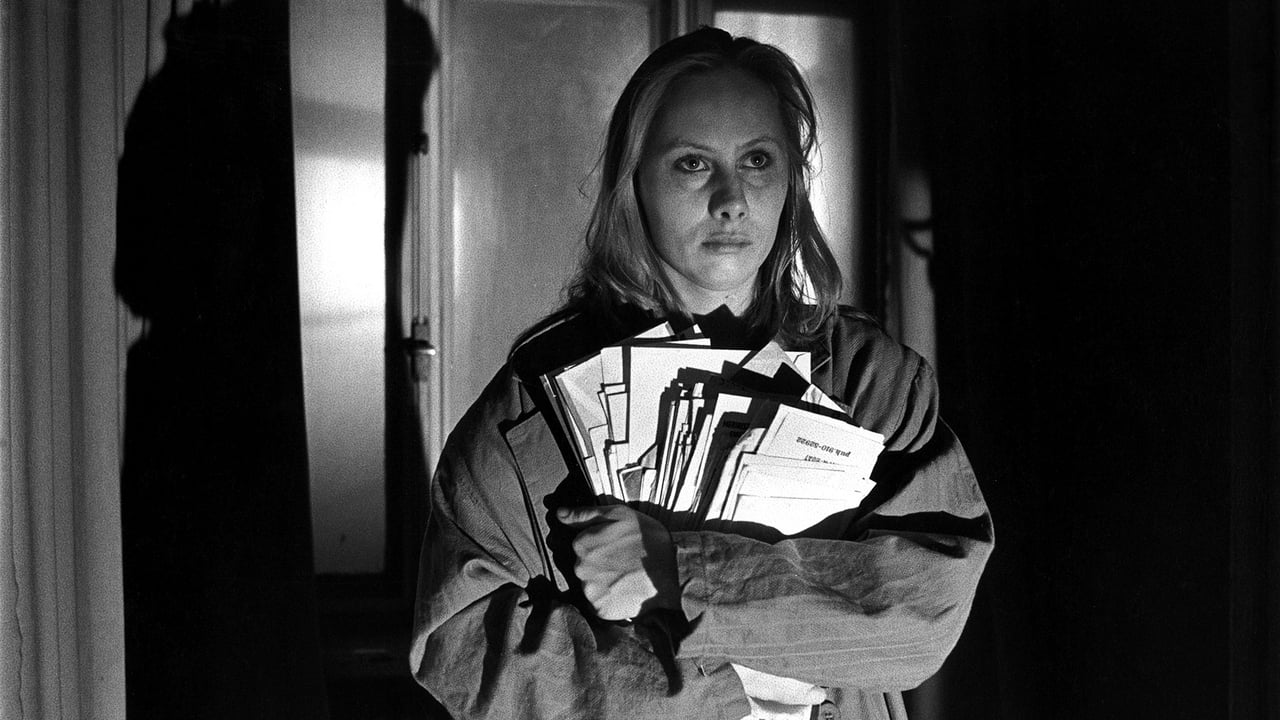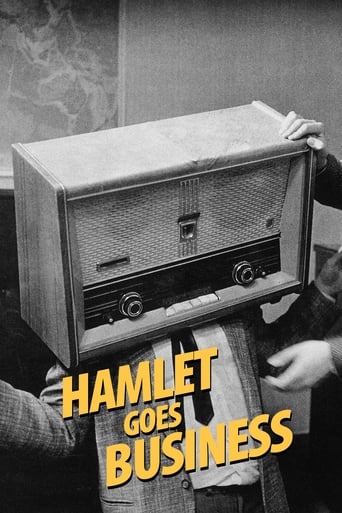



Am i the only one who thinks........Average?
It's an amazing and heartbreaking story.
This is a must-see and one of the best documentaries - and films - of this year.
View MoreIt’s not bad or unwatchable but despite the amplitude of the spectacle, the end result is underwhelming.
View MoreLike I wrote before reviewing Drifting Clouds, the actors in Kaurismäki's movies are very stiff. There's basically no emotion in the acting comparing to Hollywood movies. During Drifting Clouds I wasn't a big fan of that style, but it suits Hamlet Goes Business. It gives a certain contrast to the somewhat theatrical dialogue and the fact that this is based on a play. Also I was surprised to see how good Pirkka-Pekka Petelius was as Hamlet. He's mostly famous for being a comedian in many sketch shows, and this is honestly the first serious role I've seen him play. Of course this is a black comedy, a spoof of Hamlet, so the role is still not entirely serious.While I love most things about this movie, it's that ending that kind of bothers me. After seeing this film several times I'm already used to it, but it still feels very separate from the rest of the movie. It's added by Kaurismäki, which might explain that. I could go into lengths what bothers me about this, but I'd rather not make this review sound exactly like the analysis we did in class, and also I don't want to spoil you. The music chosen for this movie is amazing. The classical music and rock music go very well together. Most of the time there's a great harmony with what we see and what we hear, but even when there's not, it' amazing. And oh, the cinematography... Weird angles and crooked shots are so great. And of course the whole movie being in black and white amplifies the whole feeling. With colours, it wouldn't be the same film.Hamlet Goes Business is an amazing take on Hamlet, and a great satire on business world. While it's clear I will not like all of Kaurismäki's movies, I can appreciate his work and I'm glad I've found a favourite
View MoreReleased in 1987 and therefore a fairly early effort by Aki Kaurismäki, HAMLET LIIKEMAAILMASSA ("Hamlet Goes Business") is the Finnish auteur's idiosyncratic adaptation of Shakespeare's classic play. Kaurismäki sets the drama in the corporate world of 20th-century Finland: a business magnate (Pentti Auer) is murdered by his wife Gertrud (Elina Salo) and brother Klaus (Esko Salminen) so that they can marry and take over the group of companies. The deceased's son Hamlet (Pirkka-Pekka Petelius), depicted here as something of a dim-witted manchild, discovers the dark secret of his murder and moves towards revenge. At the same time, he maintains a curious love affair with Ofelia (Kati Outinen), daughter of a high-ranking employee, and also scrapes with other characters drawn ultimately from Shakespeare's play.All of the main scenes from Shakespeare's play are present here, though sometimes (like the murder of Polonius) they don't make much sense in the context of the adaptation and are shown briefly to simply telegraph them. The dialogue is mainly original, though at times it switches into the traditional Finnish translation of Shakespeare's Elizabethan English to deliberately bizarre effect. There is however a laugh-out-loud twist ending going beyond the Shakespearean source material, which turns the film into a commentary on Finnish politics and labor relations.All of Kaurismäki's films are dark comedies, though with humor so deadpan it is sometimes easy for an audience to miss it entirely. Riffing on the image of the Finnish people as taciturn and emotionless, Kaurismäki's actors are directed to state their lines in a very dry, robotic fashion. The death of Ophelia, a tragedy for the ages, is depicted here in a humorous way entirely due to Kati Outinen's deft facial expression and an unusual prop I won't spoil here. Kaurismäki's love of early rock 'n' roll and blues is present in all of his movies, and you can also expect to see a jukebox kicked into life here and a band performing on stage at some point.While I am a fan of Kaurismäki and have seen nearly all of his many films, I don't think this is one of his major efforts. The black and white photography is a weak point. Kaurismäki loves utterly drab scenery and it is a big part of his aesthetic, but paradoxically color is necessary to bring this drabness across. It also feels like this is just one more adaptation of Hamlet, even if it's an unusual one, and none of the characters are as readily likable as in Kaurismäki's own original work. Most audiences will find his preceding effort VARJOJA PARATIISISSA (Shadows in Paradise) or his following film ARIEL to be more charming and visually seductive.
View MoreIt's not that easy to make a Shakespeare adaptation set in our time. There have been successful attempts, such as Baz Luhrmann's Romeo & Juliet, but most modern-day versions of the bard's plays are doomed to oblivion. That's not the case of Hamlet Goes Business, Aki Kaurismäki's film noir take on the classic.Actually, it's more of a black comedy, similarly to Calamari Union (coincidentally, or maybe not, both films were shot in black and white), Kaurismäki's satire on Finnish lowlife. This time, the target is the big industry, within which Hamlet (Pirkka-Pekka Petelius, who also played one of the Franks in Calamari Union) is raised a spoiled brat, spending his days doing mostly nothing, bar flirt with Ofelia (Kati Outinen), whose father (Esko Nikkari) is an important business associate of Hamlet's dad. Then suddenly the situation changes, as the old man is found dead and his brother, Klaus (Esko Salminen) takes over everything, including the marital duties with Hamlet's mother (Elina Salo). Our grief-struck hero is subsequently forced into action after discovering Klaus isn't that innocent: he poisoned his own brother. Hence the inevitable questions: what should Hamlet do? Leave the murderer alone or avenge his father's assassination? In short, to be or not to be?Ironically, we never hear the protagonist say those words, or the rest of the soliloquy, for that matter. Kaurismäki cut the entire speech because according to him it was ridiculous, useless and distracting, a waste of time: Hamlet would be too busy to start reflecting on life's meaning.Apart from that (and a few tweaks at the end), Hamlet Goes Business follows Shakespeare's text very closely, albeit with the satirical tone. In fact, the movie's sole weakness is the fact that it gets a little too overblown and surreal come the conclusion, with set-pieces that are funny, yes, but slightly inappropriate in this kind of film.That said, the film is worth a viewing, if you're open-minded enough. If not, stick with Laurence Olivier or Kenneth Branagh: at least you'll get to hear the famous soliloquy.
View Morei saw this about a year after it first came out.It has become notorious for being somewhat flippant about it's source material (Shakespeare's Hamlet).Actually, I don't remember finding this very humorous at all. In fact, a darker version of the Hamlet narrative could hardly be imagined.This film represents an important historical turning point; although theatrical directors had been toying with the notion of "updating" Shakespeare, ever since Orson Welles produced a Broadway version of Macbeth with African Americans in the cast back in the late 1930s (When he made his own film version of MacBeth, he chickened out on this, unfortunately). But if the reader has seen the updated version of Romeo and Juliet out of Australia, or the Ethan Hawke Hamlet of 2000, or the recent "O" version of Othello (at last with black actors playing black roles, after all these centuries, for heaven's sake!), it all starts here.Unfortunately, as I say, this film is so incredibly dark, you'll want to know why Hamlet didn't just cut his throat - "To be, or not to be - oh, the hell with it!" Not for every taste, to say the least.
View More